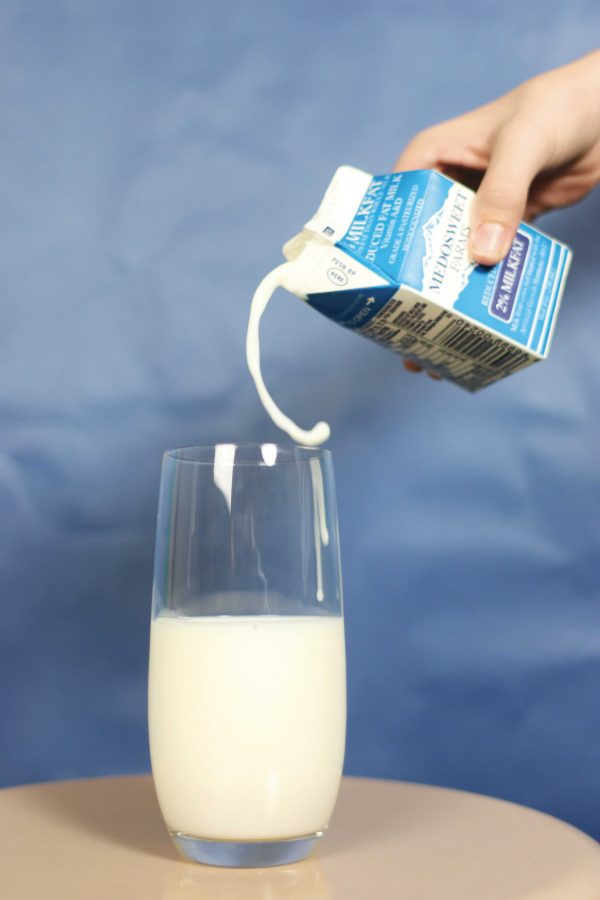Dairy consumption recommendations are unhealthy and unethical
Since we’ve been children, the benefits of drinking milk have been shoved down our throats. Literally. Our parents told us we had to drink a glass or two of milk at dinner in order to grow strong bones. For those who have gone to public school, the “Got Milk?” ads are only too familiar. Even the United States Department of Agriculture (USDA), suggests two to three servings of dairy each day. We haven’t been taught, however, that the dairy industry is filled with corruption and has deceited America about the truth of dairy.
We’ve been taught to drink milk because of its supposed high content of calcium. It turns out, drinking milk actually causes a calcium deficit because the calcium is used to neutralize the acidifying effect milk has.
“I don’t drink dairy because it’s not beneficial as long as you have a regular diet,” said freshman AJ Rossbach. Rossbach and her mother decided to go vegan for a couple of years because they heard it could lower the risk of cancer. Eating a diet rich in fruits and vegetables provides the necessary calcium a person needs.
Supposedly, the USDA’s sole mission is to promote healthy dietary choices for Americans. So it’s understandable that the majority of Americans trust its recommendations. “What people are often surprised to hear is that the food pyramid unfairly promotes the consumption of meat and dairy because six of the eleven members assigned to the US Dietary Guidelines Advisory Committee have financial ties to the meat and dairy industries,” says Che Green, who does non-profit research and advocacy organization focusing on farm animals in the United States.
This means the promotion of high consumption of meat and dairy sends money straight into the pockets of the people who are charged with “enhancing the quality of life for the American people.” Let that sink in.
Dairy farmers don’t want consumers to know what’s going into the milk sold in grocery stores. Why? Because it’s causing health problems all across the country! When cows produce milk, they also produce a naturally occurring hormone called the Bovine Growth Hormone (BGH). In its natural form, BGH is harmless to the milk’s intended consumer: baby cows. However, in order to increase milk production, recombinant BGH (rBGH) is then formed by dairy farmers and injected into dairy cows.
According to Green, since 1994 every industrialized country in the world, except the United States, has banned the use of rBGH milk. Not only does rBGH milk cause secondary sex characteristics to appear very early in children, rBGH-injected cows produce high levels of insulin Growth Factor-1, which increases chances of breast and prostate cancer. So while the rest of the world drinks milk free of such contaminants, dairy farmers and the United States government continue to endorse rBGH milk for the general public, at the same time scratching their heads about the increase of cancer and the declining age of puberty for girls.
It’s clear milk is bad for people. What about the other end of the equation: the cows? It turns out the only way animals are able to produce milk is if they’re pregnant. Dairy cows are kept pregnant throughout their lives through the injection of bull semen, hormones and antibiotics while the cows are bound to what the industry calls a “rape rack.”
“I watched several documentaries on the meat and dairy industries, and I’ve been fully vegan since then,” junior Vivian Voth said.
The average life expectancy of a cow is 25-30 years old, while the length of a dairy cow’s life ranges from just four to five years old. The cows’ short existence is pretty grim.
They suffer from a variety of infections, cystic ovaries and uterus disorders as a result of being artificially impregnated their whole lives.
“I think it’s weird that we squeeze milk out of animals to drink. It’s wrong that we drink cow’s milk because that’s not what it’s meant for,” sophomore Heiwon Muluwork said. It’s true. Breast milk is meant for babies, just like cow’s milk is meant specifically for baby cows.
By Hannah Zundel-Davis


